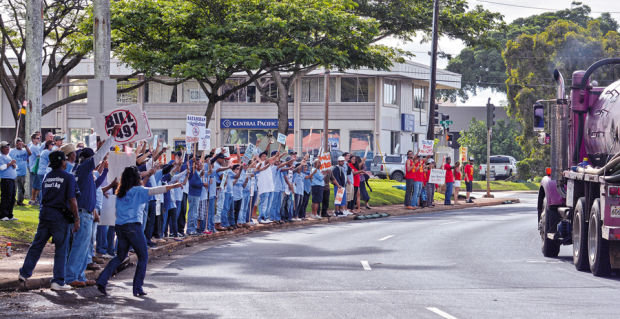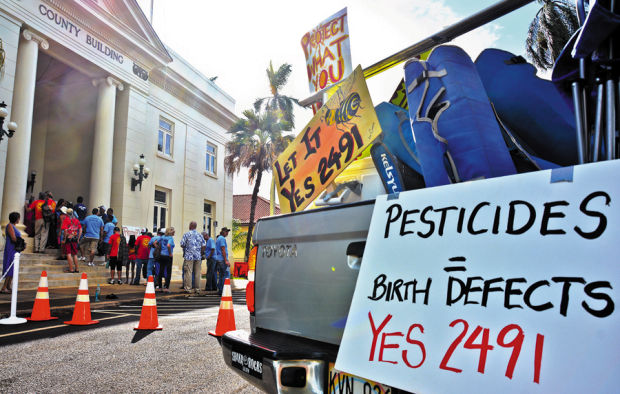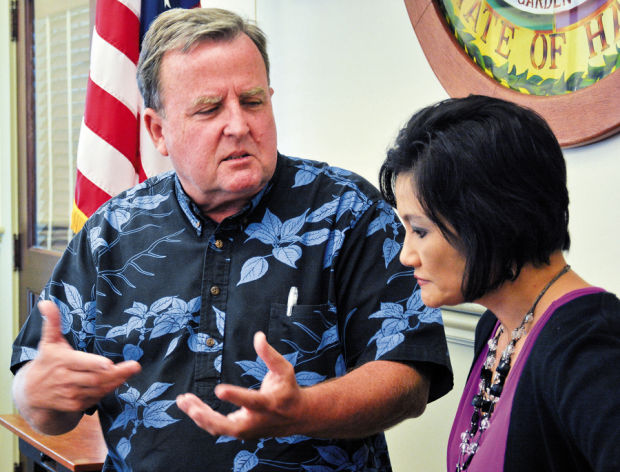LIHUE — After a marathon 13-hour meeting Friday night, a watered-down version of Bill 2491 passed out of committee. It will now head to the full Kauai County Council for consideration. While the pesticide disclosure provision gained strength, approximately half
LIHUE — After a marathon 13-hour meeting Friday night, a watered-down version of Bill 2491 passed out of committee. It will now head to the full Kauai County Council for consideration.
While the pesticide disclosure provision gained strength, approximately half of the original bill did not survive.
Still, Councilman Gary Hooser — who co-introduced the bill with Councilman Tim Bynum — described Friday’s outcome as a “huge step forward.”
“Even though we only passed about 50 percent of it, the heart of it, the “right to know” provision, actually got stronger,” he said by phone Saturday morning. “I’m very pleased we’re moving the core of the bill forward and hoping to keep working on it to make it stronger.”
Friday’s meeting, which included long discussions and hours of emotional, even desperate, public testimony from both sides, ended with the council’s Economic Development (Agriculture) Committee voting 4-1 in favor of the amended bill.
The full council meeting has not been scheduled.
In his closing remarks, well past 9 p.m., Councilman Ross Kagawa told the committee he would not be supporting the amendments. The bill should not be watered down so much that, in the end, it accomplishes nothing, he said.
However, when Kagawa’s name was called, “aye” was his reply — a surprise to several of his colleagues and the audience members who stuck through the long day.
The final tally in support drew loud cheers from bill proponents, many dressed in red “Pass the Bill” shirts.
Committee Chair Hooser, JoAnn Yukimura and Nadine Nakamura also voted in support. The lone “no” vote — a likely preview of his stance in full council — came from Councilman Mel Rapozo.
“I put on my big boy panties today when I came, and I’ll wear them all night long because I know the abuse will follow,” he said.
Addressing the audience, Rapozo said the simple and “politically easy” thing would be to vote in favor, but that he personally does not believe in it. Instead, he said the community should give the state a chance to step up where it has failed, as Gov. Neil Abercrombie promised it would last week.
“There’s a path that we need to take through the state, that I believe we can get there quicker than with 2491,” Rapozo said. “I may be wrong. But if I’m so wrong, that the majority of this community thinks I’ve outlived my time on the council, so be it. I’ll move on and someone else can do it.”
At the end of the day, Rapozo said the “right decision” would be made by the full seven-member council, not him or any other individual member.
Hooser said he disagreed with Rapozo, and that the easy decision would be to vote “no.”
“Certainly it’s tough for me right now because this amendment is a long way from where we started,” he said. “And it’s a long way in the wrong direction from my perspective.”
If passed in its current form, the bill would still require Kauai’s largest agricultural companies — DuPont Pioneer, Syngenta, Dow AgroSciences, BASF and Kauai Coffee — to disclose the presence of genetically modified crops and what pesticides they are using on the island, as well as how much, when and where. It would also establish pesticide-free buffer zones around schools, hospitals, homes and other areas, and require the county to conduct a study on the health and environmental impacts of the industry.
Provisions deleted from the bill Friday include those that would have prohibited open-air testing of experimental pesticides and genetically modified organisms, established a permitting process and placed a temporary moratorium on the expansion of GMO fields.
“There’s many provisions in this measure that I don’t like,” Hooser said. “But I’m going to be supporting it. I’m going to be supporting it because it’s a step forward. It’s a big step forward.”
Hooser applauded Yukimura and Nakamura for putting in the legwork and co-introducing the adopted amendments. He said that is what it takes to pass good legislation, but that he would continue his efforts to re-strengthen the bill at the full council level.
“We’ve come a long ways and we’re keeping our eye on the prize,” he said.
Yukimura said it was clear to her that there are effects of pesticide drift on Kauai’s Westside which are not being properly addressed by the Department of Agriculture and the Environmental Protection Agency.
“I do not believe that they are inherently bad,” she said of the agencies. “But I have noticed that whenever we talk about pesticide enforcement, they focus on the certified applicator and there’s very little awareness even of the drift problems. I think it’s something we have to step forward on.”
While anecdotal information from local doctors abut medical problems related to pesticides is not sufficient to justify a moratorium at this time, Yukimura said it is compelling enough to conduct epidemiological studies.
Disclosure, buffer zones and the study are the “foundation for future action,” she said.
“We really need to walk before we run.”
Nakamura, who at previous committee meetings voiced concerns about the legalities of certain portions of the bill, described the amended version Friday as a “compromise.”
Amendments
While the original bill called for the island’s heaviest pesticide users to provide annual reports of all pesticides used, the new version would require them to submit detailed weekly reports, which would include active ingredients, date, time, field number wind speed and more.
The information would be submitted to the county’s Office of Economic Development and posted online for public viewing.
Additionally, companies would be required to post signage in the area before, during and after application, as well as provide property owners within 1,500 feet of their operations with pre-application “Good Neighbor Courtesy Notices.”
The disclosure provision still calls for ag companies to provide annual reports for the presence of all GMO crops.
The 500-foot buffer zones around schools, hospitals and homes remains in tact. However, the setbacks around parks, public roadways, streams, rivers and shorelines was reduced to 100 feet.
The Environmental Impact Statement was replaced with joint fact-finding study, which Yukimura and Nakamura are calling an Environmental and Public Health Impact Study. It would be completed by the county through a two-part community-based process to address key environmental and public health questions related to large-scale commercial agriculture entities using pesticides and growing GMOs, according to the bill.
The rest of the bill’s main provisions were deleted, but could be reintroduced at the full council.
Addressing the moratorium issue, Yukimura said she spoke with the four biotech seed companies, which have agreed to not expand operations north of the Wailua River, pending the county’s fact-finding study.
While it may seem like a welcome offer, Hooser described the proposal as “insulting to the community” as it does not include the island’s Westside.
Still, he said Saturday he was pleased with the progress so far.
“Should we be happy? Yes,” he said. “Is it enough? No.”
• Chris D’Angelo, environmental reporter, can be reached at 245-0441 or cdangelo@thegardenisland.com.




